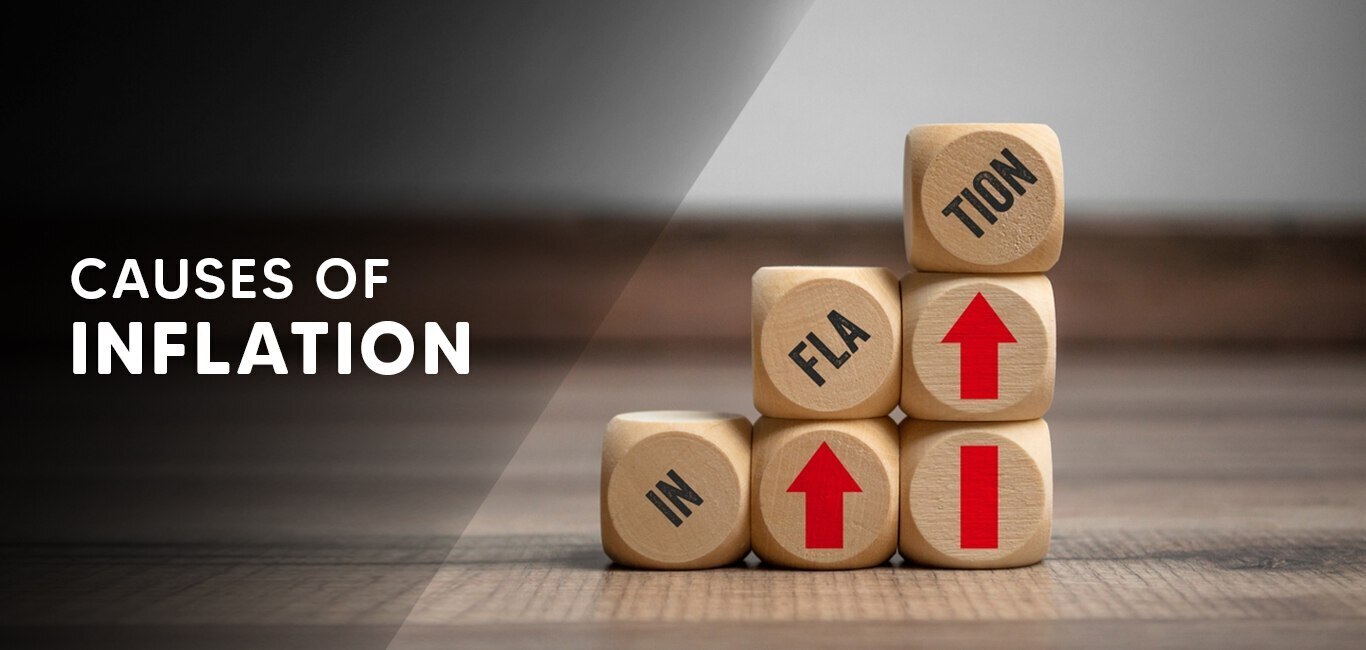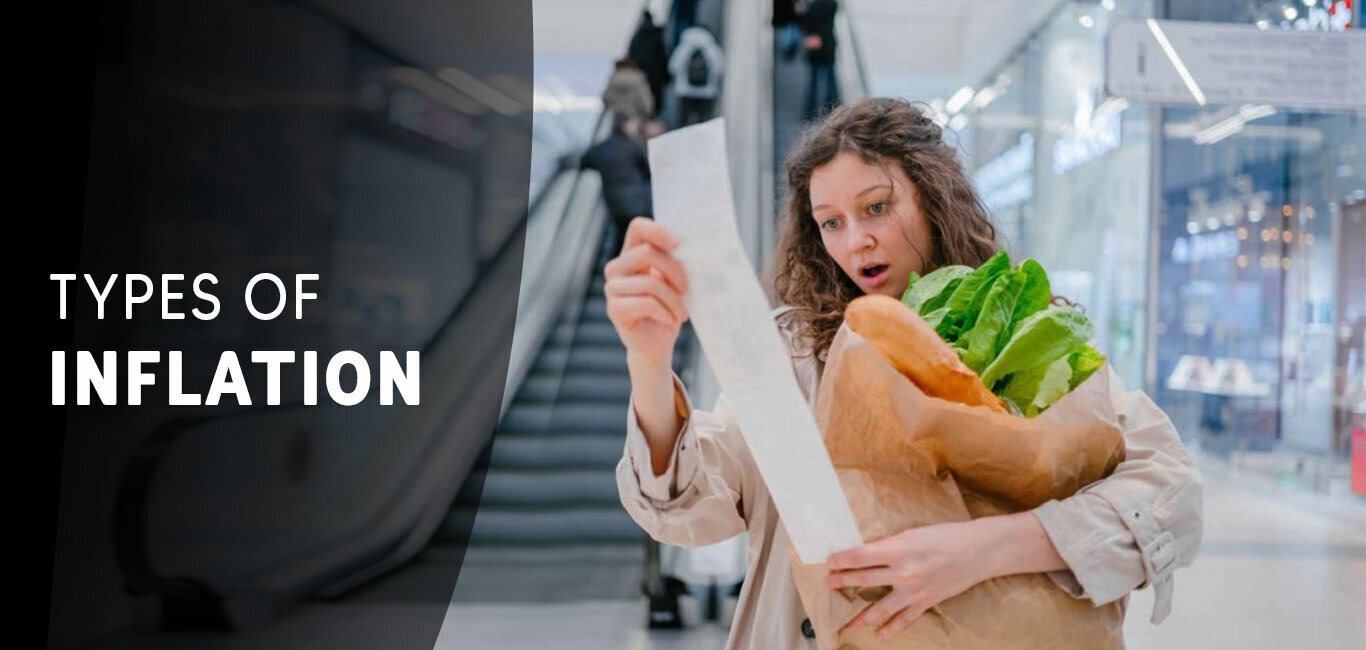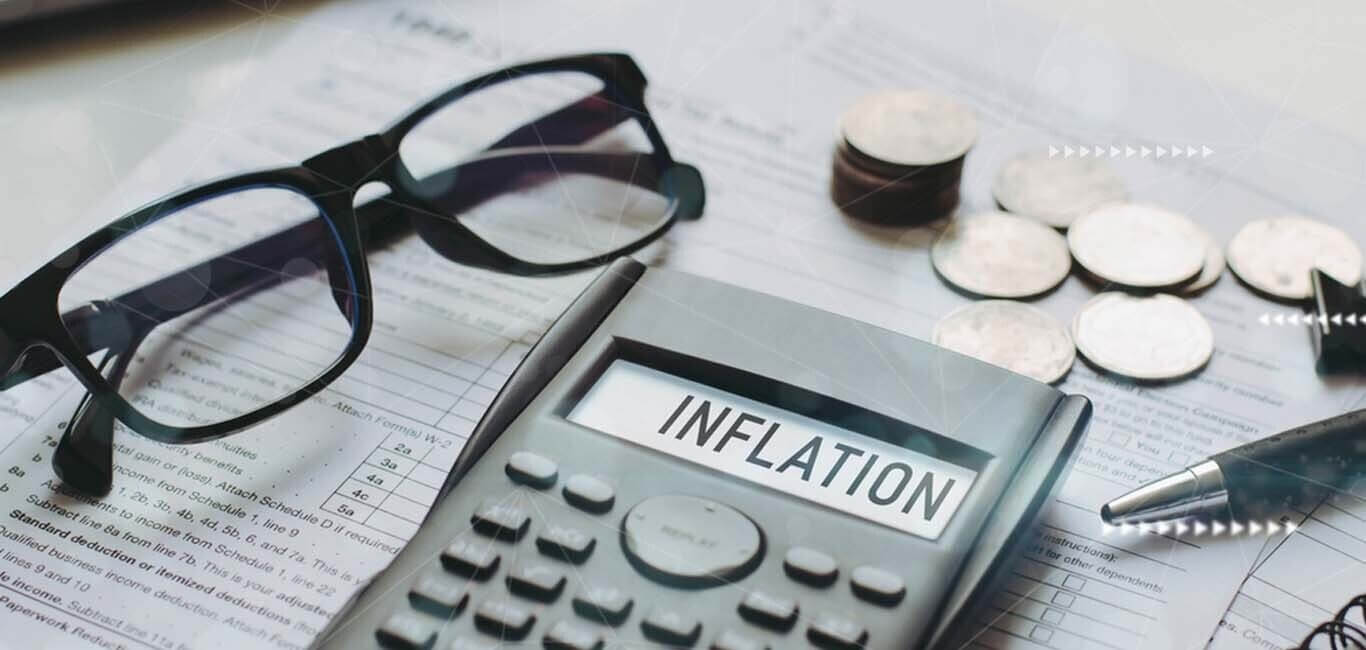What is Inflation?
Inflation is simply an increase in the prices of goods or services over time. It affects the purchasing power of the inhabitants of a region. From daily use items like food, clothes, etc. to luxury items, rates of everything escalate, and people find it difficult to buy even common goods. With the rise in inflation, the value of currency also drops as you now can purchase limited items with the same amount.
The measurement of inflation depends on certain factors; however, one can evaluate it by observing the overall impact of price rise on goods or services. As consumers buy a diversified number of items, their purchasing power expands over all those items. Therefore, a rise or fall in the consumers’ purchasing power is a common indicator of inflation.

Causes of Inflation
A rise in inflation can be due to certain reasons. Let’s discuss some of the key causes of inflation.
A Rise in Money Supply
An increase in the money supply is one of the key reasons for inflation. The money supply is defined as the total amount of money circulating in a given economy. Whenever there is an increase in the money supply, it leads to higher goods in prices.
Deficiency in Supply of Imported Goods
Pakistan is a small country with heavy dependence on imported items. From food items and clothes to mechanical parts and electronics, the list of imported consumer items extends across a broad spectrum. When there is a shortage of imported items, their prices increase accordingly.
Lack of Power Input
Consumer items are manufactured in factories. A lack of power supply shuts down industrial units limiting their ability to cope with the average demand supply of goods. This also results in higher prices of goods.
Another reason for inflation associated with industrial units is the increased production cost. Due to more government-imposed taxes, higher electricity rates, etc., the net production cost of items increases which ultimately means that consumers would have to pay more price for a certain product.
Currency Devaluation
Currency devaluation is another prominent reason behind the country’s increasing inflation. A fall in rupee value means a lesser number of imported items can be purchased. In other words, the prices of imported items increase if your currency falls. Hence, the costs of imported consumer items rise in the market.

Types of Inflation
Demand-Pull Inflation
When consumers spend much amount of money, they buy more products than are available in the market. This positive consumer behaviour means higher spending which results in a demand-supply gap with a total number of purchasable items lesser than the consumers’ demand. Consequently, this gap leads to higher prices. It can also be termed as a demand-pull effect.
Cost-Push Inflation
Cost-push inflation works like a chain mechanism that initiates at one point and ends at the other. This inflation kicks off when there is a price increase in production units. When industrial units purchase raw materials at higher rates, they increase the net value of the manufactured product. For example, if a factory purchases oil at high prices, then eventually the prices of oil-based products would be high.
Built-in Inflation
The moment people expect prices to rise continuously, they start demanding more wages from their employers. This gives rise to built-in inflation. For example, a business owner that gives handsome salary packages to his employees would surely sell his products or services at higher rates. In the long run, the consumer would find that product an expensive one.
Impacts of Inflation
Although inflation might be a little bit beneficial for certain businesses like real estate, yet the larger impacts of inflation are immensely devastating for a country.
Reduces Consumer Purchasing Power
Sadly, this is the most significant drawback of inflation. A slight rise in the prices of goods affects the purchasing power of consumers and they find it difficult to buy common commodities. Specifically, persons with low incomes barely make ends meet as a significant proportion of their income is consumed in buying ordinary daily use items. That’s the reason the government authorities keep this section of society under special focus whenever it has to rise prices.
Higher Interest Rates
With the rising inflation, banks and other financial bodies increase interest rates. Abruptly, the value of monthly instalments increases in banking sectors. Again, the consumer either has to pay more amount in their instalments or cannot purchase items due to high interest rates.
Unemployment
Unemployment is another devastating impact of inflation that affects the common man terribly. When businesses have to buy costly raw materials, they suffer losses and eventually shut down, which results in unemployment. Certain businesses and industrial units can also close if they don’t have sufficient imported raw materials to meet the demand. They lay off their employees due to limited production orders and consequently, the graph of unemployment gets steeper.
Uncertainty in the Market
Rising inflation leads to uncertainty among businessmen. They become doubtful of their profits as the prices fluctuate haphazardly. Investors are not sure about the market conditions and likewise, consumers are also uncertain about the rates of daily use items. This all contributes towards a wave of uncertainty in the market that further aggravates the situation.
Restricted Economic Growth
To sum it up, inflation results in restricted economic growth. Due to uncertainty of the market situation, unemployment, and diminished consumer purchasing power, the cycle of money stops in the market. From manufacturer to consumer, everyone reduces purchasing and selling of items and this proves to be a risky situation for the country.

Effective Ways to Fight Inflation
Inflation is a serious concern for persons of every section in a country, whether they belong to the government or the general masses. Certain steps can be taken by people on every level to limit inflation. Below are some effective measures at the consumer level that can assist in minimising the impacts of inflation.
Think About Saving Options
Financial savings can prove to be a sensible measure when you have to fight inflation. With the help of saving institutions, you can save a handsome amount for your difficult times. Moreover, your saved assets can be considerably beneficial for your children in terms of their higher education, health emergency, marriage, etc. Numerous insurance companies offer multiple saving plans that let you find your way out of a financial crisis.
Watch Out for Your Expenses
A key element to fighting inflation is managing your expenses wisely. The moment you improve your spending habits, you can significantly control the impacts of inflation. You can take every thrifty measure in this regard.
For example, adopting a simple lifestyle can certainly help you. Rather than buying expensive goods, you should buy economical items that would save you money. Likewise, instead of buying costly toys for your kids, let them hang out and enjoy physical games. Similarly, rather than going to the cinema repeatedly, you can go to a park and enjoy some healthy activity.
Control Your Grocery Spending
Grocery items cost you a considerable amount in your monthly budget. Managing these expenses can significantly reduce your spending and provide you with an opportunity to make some savings. For managing your grocery budget, find some time and always make a list of essential items before going for buying grocery items.
Don’t Rush for the Trends
New mobile, trendy apparel, the latest model of cars and shoes, and other similar items are always costly that damage your budget. Instead of buying these expensive and luxurious items, go for cheap, durable and easily accessible items that would serve you both purposes simultaneously: fulfilling your need and not burdening your budget.
Another sensible thing to look for is investing in or buying quality products that would last longer and you would not have to buy items every now and then.
Plan a Budget
Whenever a new month starts, plan your budget wisely before going shopping. Planning your budget proves very important in regulating your money flow. It keeps track of your spending and identifies if there is a need for any alteration in your budget. Budgeting assists in a careful evaluation of your income, making your monthly spending easier and helping you avoid any financial chaos in case of random spending.





